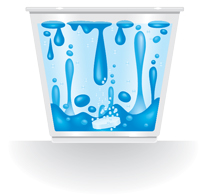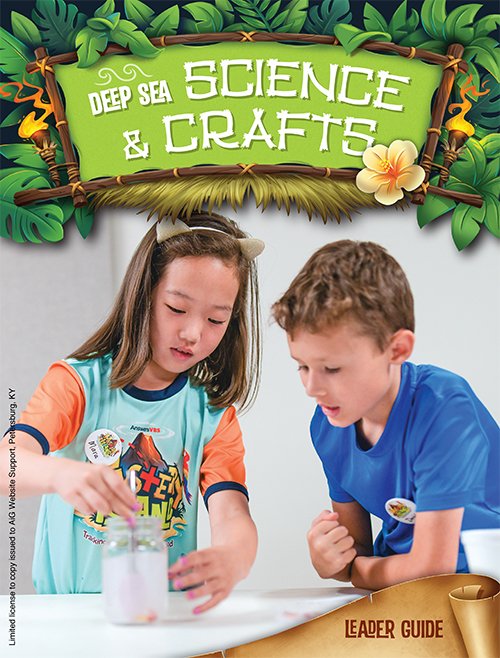Lava Lamps
Day Four Experiment
on November 22, 2021Materials (for individuals or groups of 3–4 students)

- 1/2 c. baby oil
- Bowls with water and food coloring, several different colors on each table
- Alka Seltzer®, 1/2 tablet per student or group, passed out by leaders
- Droppers or transfer pipettes, 1 for every individual or group
- 9-oz. clear cups
Pre-Prep
Prepare bowls of water with food coloring and place several colors on each table. Place several droppers/pipettes on each table. Each group or individual should have a clear cup filled 2/3 full with baby oil (about 1/2 c.).
Teaching Tie-In
Can you think of anyone who is patient? Pause for responses. Who is it, and why do you say he or she is patient? Take responses. Did you know the Bible tells us in many verses that God is patient? He is patient with us in so many ways, and I’m so, so thankful for his patience. In fact, the Bible says God is patient and wants none to perish, but for us to be his children. Read 2 Peter 3:9. But over and over people don’t take God seriously. They don’t obey him, or they even ignore him. For instance, the Bible tells of a time when the whole earth was sinning continually except for one man named Noah. God asked Noah to make a big boat. Anyone who trusted in God could get on the boat and be saved from a worldwide flood. But people laughed at Noah and went on about their lives, living for themselves and not for God. After many years, God sent the flood because, of course, God does everything he says he will do. The flood changed the whole earth. It even caused underwater volcanoes to go off, which ended up becoming some of our islands of today. So when we see volcanoes, they can be a reminder of a time when people wouldn’t put their trust in God, even though he warned them and patiently waited for them to come to him. I sure hope you take God seriously and believe he will do what he says he will do. And I hope you are thankful that he is a patient God. Now let’s make our own lava lamps as a reminder of this.
Class Time Directions
Did you realize there are underwater volcanoes? In fact, some islands are the tops of volcanoes that start in the ocean! Some types of islands are made by building up layers of lava from volcanic eruptions. In this experiment we can visualize what the lava looks like in the ocean. Instruct children to use the droppers to add two to three drops of colored water into their cups of oil. Then add a piece of an Alka Seltzer® tablet to their cup.
Instruct them to watch the colored water. If they used different colors, are they staying separate or mixing together?
What you’re observing is oil that is hydrophobic. Let’s see if you can say hydrophobic. Do so. Hydro means “water” and phobic means “fear of.” So what do you think hydrophobic means? Take answers. Yes, fear of water! The oil doesn’t like the water, so the two will not mix together.
Does anyone remember what the word is for substances that love water? We talked about this word when we put water in the diapers the other day. Take answers—hydrophilic. So one big word means a fear of water and one means a love of water. Which one means a fear of water? Take answers—hydrophobic. Which one means a love of water? Take answers—hydrophilic.
Just like we created mini volcanoes in our cups, it’s amazing to think that some islands are really just the result of underwater volcanoes that occurred during the worldwide flood of Noah’s day. Wow!
Tip Corner
- You can reuse most of the oil by pouring off the top and separating it from the water at the bottom.
- Science terms introduced (or re-introduced) today are hydrophobic and hydrophilic.
Mystery Island Deep Sea Science & Crafts
Kids love science experiments and crafts! This guide contains everything you need to coordinate the daily science experiments and crafts for all age groups.
Browse Kids Book- © 2025 Answers in Genesis
- Privacy Policy
- Contact
- About

